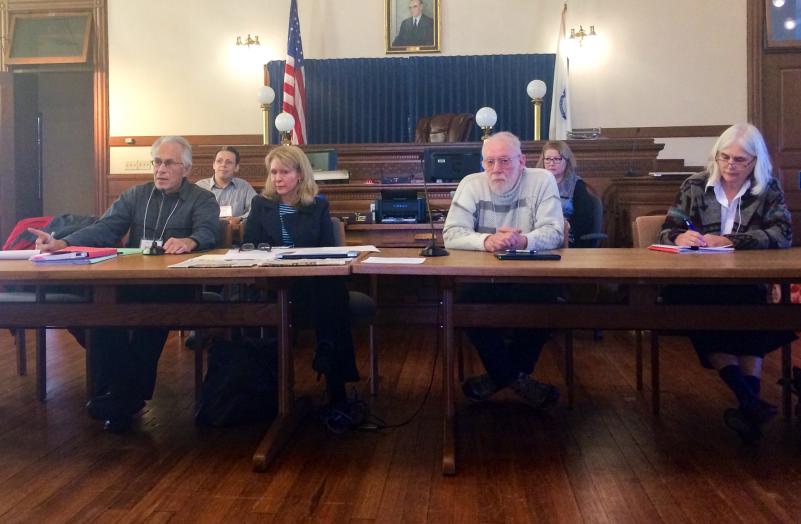By DIANE BRONCACCIO
For the Daily Hampshire Gazette
WENDELL — While the regional WiredWest cooperative and the Massachusetts Broadband Institute iron out differences over how to bring broadband Internet to the area’s unserved towns, Wendell and several other Hilltowns are looking at ways to build a regional network.
The Wendell Select Board will meet with town officials from Leverett, Shutesbury, Warwick, New Salem, Leyden and Colrain at 7 p.m. Thursday to discuss forming a regional broadband network. The meeting will be held in the Wendell Town Office, at 9 Morse Village Road.
“Wendell is trying to organize a possible alternative to WiredWest, by forming a regional (broadband) network,” said Select Board member Daniel Keller. He said this smaller fiber-optic network might connect to LeverettNet, the fiber-optic-to-the-home broadband network built and run by that town.
“Leverett has already built connections for future possible connections to neighboring towns,” said Keller. Also, Colrain and Leyden have expressed interest in being part of such a network, even if they do not border the other towns.
Technically, all are members of the WiredWest collaborative, which has been working since 2010 to bring “last-mile” fiber-optic broadband to rural towns without high-speed Internet access. Wendell was one of the first WiredWest member towns to reach the goal of getting at least 40 percent of its residents to register in advance with WiredWest for high-speed broadband.
Wendell, Colrain, Otis and Alford were also the first towns to move independently of WiredWest, by notifying the Massachusetts Broadband Institute last fall that they had secured borrowing for their towns’ broadband build-out and were ready to move forward with the build-out. The institute has the $40 million in state money earmarked for the unserved towns.
“Eric Nakajima was very enthusiastic about supporting us,” said Keller. “I understand MBI is going to issue (requests for proposals) this month.” He said the plan is for the institute to design the entire regional network. “Smaller projects could go under that umbrella,” Keller said.
On Dec. 1, Nakajima, the former director of the Massachusetts Broadband Institute, announced that the agency did not support WiredWest’s plan. It calls for the state and towns paying for the network which would be owned and operated by WiredWest LLC. Nakajima said the institute would not release money for the WiredWest plan at that time.
Last month, WiredWest revised its draft operating agreement, and negotiations with the institute are continuing.
WiredWest officials have said that, under its draft agreement, the towns still “own” the infrastructure, because they would be shareholders whose shares are proportional to the size of their broadband infrastructure investment.
“We have some deep and fundamental problems with WiredWest that I and others started talking about years ago,” said Keller. “I had problems with ownership, that WiredWest still hasn’t solved. It really is a line in the sand, and many towns have said: ‘No. We’re not going to borrow money and pay for something that isn’t ours.’?”
Wendell Broadband Committee members Ray DiDonato and Ben Schwartz said there have been “significant concerns coming from the towns” about WiredWest’s business plans, including the agreement that gives ownership to WiredWest LLC instead of to towns directly.
“We’ve been fairly thoughtful in looking at different options, than when WiredWest was the only option on the table,” Schwartz said. “WiredWest is wanting to start a company based on town funding, and we have to have some solid guarantees that don’t have a 10-year encumbrance,” he said, referring to the minimum amount of time a town would be required to stay with WiredWest.
DiDonato said Wendell continues to be a WiredWest member town, but is following the procedures recommended by the institute, and will be seeking requests for proposals soon.
In Leyden, Broadband Committee Chairman Bob Ryan said the town is grateful to WiredWest for championing last-mile broadband over several years. “They brought the public awareness and they brought us funding.
“They raised the issues and brought us where we are today. I don’t mean to abandon them in any way, but we believe, in the case of Leyden, that we should own our assets,” Ryan said. “We’re all looking for the best solution. If it’s WiredWest, so be it. But it’s an evolving process. We’re all in favor of owning our own assets. We made it very clear that we support the MBI position, that towns’ should own their infrastructure, and we’re hoping that (WiredWest) will change their mind in that regard.”
Ryan said Leyden officials have also spoken to Greenfield about connecting to that town’s broadband network when it is operating.
In talks with WiredWest, Colrain Select Board members have voiced concerns similar to those in Wendell about whether the operating agreement would leave the town paying for an asset it did not own, and they questioned whether WiredWest’s business plan would produce enough revenue to eventually pay down the money borrowed by the towns.


